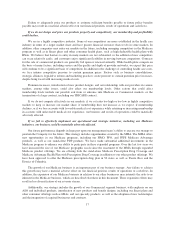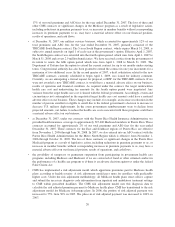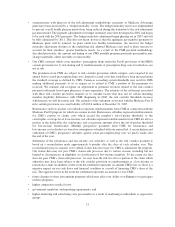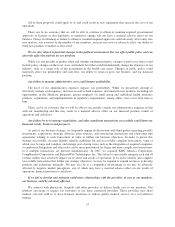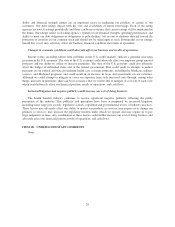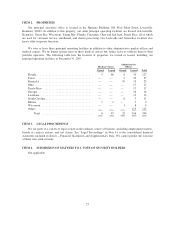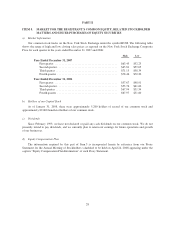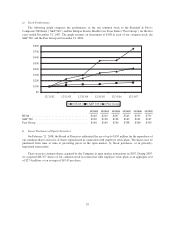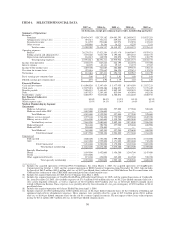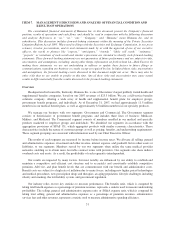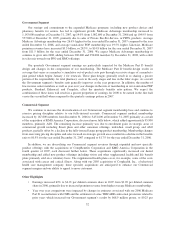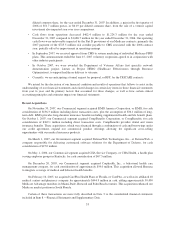Humana 2007 Annual Report Download - page 35
Download and view the complete annual report
Please find page 35 of the 2007 Humana annual report below. You can navigate through the pages in the report by either clicking on the pages listed below, or by using the keyword search tool below to find specific information within the annual report.In any particular market, providers could refuse to contract with us, demand to contract with us, demand
higher payments, or take other actions that could result in higher health care costs for us, less desirable products
for customers and members or difficulty meeting regulatory or accreditation requirements. In some markets,
some providers, particularly hospitals, physician specialty groups, physician/hospital organizations or multi-
specialty physician groups, may have significant market positions and negotiating power. In addition, physician
or practice management companies, which aggregate physician practices for administrative efficiency and
marketing leverage, may compete directly with us. If these providers refuse to contract with us, use their market
position to negotiate favorable contracts or place us at a competitive disadvantage, our ability to market products
or to be profitable in those areas could be adversely affected.
In some situations, we have contracts with individual or groups of primary care physicians for an actuarially
determined, fixed, per-member-per-month fee under which physicians are paid an amount to provide all required
medical services to our members. This type of contract is referred to as a “capitation” contract. The inability of
providers to properly manage costs under these capitation arrangements can result in the financial instability of
these providers and the termination of their relationship with us. In addition, payment or other disputes between a
primary care provider and specialists with whom the primary care provider contracts can result in a disruption in
the provision of services to our members or a reduction in the services available to our members. The financial
instability or failure of a primary care provider to pay other providers for services rendered could lead those other
providers to demand payment from us even though we have made our regular fixed payments to the primary
provider. There can be no assurance that providers with whom we contract will properly manage the costs of
services, maintain financial solvency or avoid disputes with other providers. Any of these events could have an
adverse effect on the provision of services to our members and our operations.
Our recently implemented mail order pharmacy business subjects us to additional regulations in addition
to those we face with our core health benefits businesses.
We have opened a mail order pharmacy business that subjects us to extensive federal, state and local
regulation. We are also subject to risks inherent in the packaging and distribution of pharmaceuticals and other
health care products, and the application of state laws related to the operation of internet and mail-services
pharmacies. The failure to adhere to these laws and regulations could expose our pharmacy subsidiary to civil
and criminal penalties.
Our ability to obtain funds from our subsidiaries is restricted.
Because we operate as a holding company, we are dependent upon dividends and administrative expense
reimbursements from our subsidiaries to fund the obligations of Humana Inc., our parent company. These
subsidiaries generally are regulated by states’ Departments of Insurance. We are also required by law to maintain
specific prescribed minimum amounts of capital in these subsidiaries. The levels of capitalization required
depend primarily upon the volume of premium generated. A significant increase in premium volume will require
additional capitalization from our parent company. In most states, we are required to seek prior approval by these
state regulatory authorities before we transfer money or pay dividends from these subsidiaries that exceed
specified amounts, or, in some states, any amount. In addition, we normally notify the state Departments of
Insurance prior to making payments that do not require approval. In the event that we are unable to provide
sufficient capital to fund the obligations of Humana Inc., our operations or financial position may be adversely
affected.
Downgrades in our debt ratings, should they occur, may adversely affect our business, financial
condition and results of operations.
Claims paying ability, financial strength, and debt ratings by recognized rating organizations are an
increasingly important factor in establishing the competitive position of insurance companies. Ratings
information is broadly disseminated and generally used throughout the industry. We believe our claims paying
25




